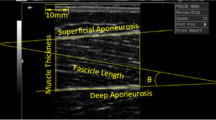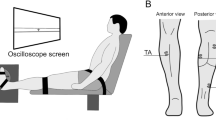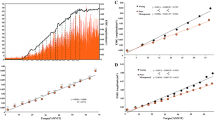Abstract
This study investigated the contribution of muscle architecture to the differences in the torque–velocity and power–velocity relationships between older (OM n = 9, aged 69–82 years) and younger men (YM n = 15, aged 19–35 years). Plantarflexors’ (PF) maximal isometric and concentric torques were recorded at 0.87, 1.75, 2.62, 3.49 and 4.36 rad s−1. Physiological cross-sectional area (PCSA) was calculated as the ratio of muscle volume (determined by magnetic resonance imaging) to muscle fascicle length (L f, measured by ultrasonography). GM PCSA and L f of the OM were, respectively, 14.3% (P < 0.05) and 19.3% (P < 0.05) smaller than of the YM. In the OM, GM maximum isometric torque and maximum contraction velocity (V max), estimated from Hill’s equation were, respectively, 48.5 and 38.2% lower (P < 0.001) than in the YM. At all contraction velocities, the OM produced less torque than the YM (46.3% of YM at 0.87 rad s−1 to 14.7% at 4.36 rad s−1, P < 0.001). Peak power (PP) of the OM was 80% lower than that of the YM and normalisation of PP to muscle volume only reduced this difference by 10%. Normalisation of torque to PCSA reduced, but did not eliminate, differences in torque between YM and OM (9.6%) and differences in torque/PCSA increased with contraction velocity (P < 0.05). After normalisation of velocity to L f, the difference in V max between the OM and the YM was reduced to 15.9%. Thus, although muscle architecture contributes significantly to the differences in the torque– and power–velocity properties of OM and YM, other contractile factors, intrinsic to the muscle, seem to play a role. It is noteworthy that the deficit in PP between OM and YM is far greater than that of muscle torque, even after normalisation of PP to muscle volume. This finding likely plays an important role in the loss of mobility in old age.



Similar content being viewed by others
References
Akima H, Kano Y, Enomoto Y, Ishizu M, Okada M, Oishi Y, Katsuta S, Kuno S (2001) Muscle function in 164 men and women aged 20–84 year. Med Sci Sports Exerc 33:220–226
Andersen JL (2003) Muscle fibre type adaptation in the elderly human muscle. Scand J Med Sci Sports 13:40–47
Bazzucchi I, Marchetti M, Rosponi A, Fattorini L, Castellano V, Sbriccoli P, Felici F (2005) Differences in the force/endurance relationship between young and older men. Eur J Appl Physiol 93:390–397
D’Antona G, Pellegrino MA, Adami R, Rossi R, Carlizzi CN, Canepari M, Saltin B, Bottinelli R (2003) The effect of ageing and immobilization on structure and function of human skeletal muscle fibres. J Physiol 552:499–511
D’Antona G, Pellegrino MA, Carlizzi CN, Bottinelli R (2007) Deterioration of contractile properties of muscle fibres in elderly subjects is modulated by the level of physical activity. Eur J Appl Physiol (Epub ahead of print)
Delbono O, Renganathan M, Messi ML (1997) Excitation-Ca2+ release–contraction coupling in single aged human skeletal muscle fiber. Muscle Nerve Suppl 5:S88–92
Doherty TJ (2003) Invited review: aging and sarcopenia. J Appl Physiol 95:1717–1727
Frontera WR, Hughes VA, Fielding RA, Fiatarone MA, Evans WJ, Roubenoff R (2000a) Aging of skeletal muscle: a 12-year longitudinal study. J Appl Physiol 88:1321–1326
Frontera WR, Suh D, Krivickas LS, Hughes VA, Goldstein R, Roubenoff R (2000b) Skeletal muscle fiber quality in older men and women. Am J Physiol––Cell Physiol 279:C611–618
Gajdosik RL, Vander Linden DW, Williams AK (1999) Concentric isokinetic torque characteristics of the calf muscles of active women aged 20–84 years. J Orthop Sports Phys Ther 29:181–190
Grassi B, Cerretelli P, Narici MV, Marconi C (1991) Peak anaerobic power in master athletes. Eur J Appl Physiol 62:394–399
Herzog W, Hasler E, Abrahamse SK (1991) A comparison of knee extensor strength curves obtained theoretically and experimentally. Med Sci Sports Exerc 23(1):108–114
Hill AV (1938) The heat of shortening and the dynamic constants of muscle. In: Proc R Soc B, 126, 136–195
Höök P, Sriramoju V, Larsson L (2001) Effects of aging on actin sliding speed on myosin from single skeletal muscle cells of mice, rats, and humans. Am J Physiol––Cell Physiol 280:C782–788
Hortobagyi T, Zheng D, Weidner M, Lambert NJ, Westbrook S, Houmard JA (1995) The influence of aging on muscle strength and muscle fiber characteristics with special reference to eccentric strength. J Gerontol Ser A—Biol Sci Med Sci 50:B399–406
Hughes VA, Frontera WR, Wood M, Evans WJ, Dallal GE, Roubenoff R, Fiatarone Singh MA (2001) Longitudinal muscle strength changes in older adults: influence of muscle mass, physical activity, and health. J Gerontol Ser A—Biol Sci Med Sci 56:B209–217
Jubrias SA, Odderson IR, Esselman PC, Conley KE (1997) Decline in isokinetic force with age: muscle cross-sectional area and specific force. Pflugers Arch––Eur J Physiol 434:246–253
Klein CS, Rice CL, Marsh GD (2001) Normalized force, activation, and coactivation in the arm muscles of young and old men. J Appl Physiol 91:1341–1349
Kubo K, Kanehisa H, Azuma K, Ishizu M, Kuno SY, Okada M, Fukunaga T (2003) Muscle architectural characteristics in young and elderly men and women. Int J Sports Med 24(2):125–130
Lanza IR, Towse TF, Caldwell GE, Wigmore DM, Kent-Braun JA (2003) Effects of age on human muscle torque, velocity, and power in two muscle groups. J Appl Physiol 95:2361–2369
Larsson L, Li X, Frontera WR (1997) Effects of aging on shortening velocity and myosin isoform composition in single human skeletal muscle cells. Am J Physiol 272:C638–649
Lieber RL, Friden J (2000) Functional and clinical significance of skeletal muscle architecture. Muscle and Nerve 23:1647–1666
Lindle RS, Metter EJ, Lynch NA, Fleg JL, Fozard JL, Tobin J, Roy TA, Hurley BF (1997) Age and gender comparisons of muscle strength in 654 women and men aged 20–93 year. J Appl Physiol 83:1581–1587
Lynch NA, Metter EJ, Lindle RS, Fozard JL, Tobin JD, Roy TA, Fleg JL, Hurley BF (1999) Muscle quality. I. Age-associated differences between arm and leg muscle groups. J Appl Physiol 86:188–194
Macaluso A, Nimmo MA, Foster JE, Cockburn M, McMillan NC, De Vito G (2002) Contractile muscle volume and agonist–antagonist coactivation account for differences in torque between young and older women. Muscle Nerve 25(6):858–863
Margaria R, Agemo P, Rovelli E (1966) Measurement of muscular power (anaerobic) in man. J Appl Physiol 21:1662–1664
McNeil CJ, Vandervoort AA and Rice CL (2007) Peripheral impairments cause a progressive age-related loss of strength and velocity-dependent power in the dorsiflexors. J Appl Physiol (In press)
Morse C, Thom J, Birch K, Narici M (2005) Changes in triceps surae muscle architecture with sarcopenia. Acta Physiol Scand 183:291–298
Morse CI, Thom JM, Davis MG, Fox KR, Birch KM, Narici MV (2004) Reduced plantarflexor specific torque in the elderly is associated with a lower activation capacity. Eur J Appl Physiol 92:219–226
Narici MV (1992) Antropometria volumetrica. In: Bozzetti F and Guarnieri R (eds) Manuale di nutrizione artificiale, Masson (Publ), Milan, vol 59, pp 793–804
Narici MV, Maganaris CN, Reeves ND, Capodaglio P (2003) Effect of aging on human muscle architecture. J Appl Physiol 95:2229–2234
Narici MV, Maganaris CN (2006) Adaptability of elderly human muscles and tendons to increased loading. J Anat 208(4):433–443
Payne AM, Delbono O (2004) Neurogenesis of excitation–contraction uncoupling in aging skeletal muscle. Exerc Sport Sci Rev 32:36–40
Porter MM, Myint A, Kramer JF, Vandervoort AA (1995) Concentric and eccentric knee extension strength in older and younger men and women. Can J Appl Physiol 20:429–439
Porter MM, Vandervoort AA, Kramer JF (1997) Eccentric peak torque of the plantar and dorsiflexors is maintained in older women. J Gerontol Ser A—Biol Sci Med Sci 52:B125–131
Poulin MJ, Vandervoort AA, Paterson DH, Kramer JF, Cunningham DA (1992) Eccentric and concentric torques of knee and elbow extension in young and older men. Can J Sport Sci 17:3–7
Pousson M, Lepers R, Van Hoecke J (2001) Changes in isokinetic torque and muscular activity of elbow flexors muscles with age. Exp Gerontol 36:1687–1698
Vandervoort AA, Kramer JF, Wharram ER (1990) Eccentric knee strength of elderly females. J Gerontol 45:B125–128
Vandervoort AA, McComas AJ (1986) Contractile changes in opposing muscles of the human ankle joint with aging. J Appl Physiol 61(1):361–367
Wickiewicz TL, Roy RR, Powell PL, Perrine JJ, Edgerton VR (1984) Muscle architecture and force–velocity relationships in humans. J Appl Physiol 57(2):435–443
Wilkie DR (1949) The relation between force and velocity in human muscle. J Physiol 110(3–4):249–280
Acknowledgments
The authors would like to thank Ian Rothwell for his technical assistance. This study was supported by the European Commission Framework V funding (‘Better-Ageing’ Project, No. QLRT-2001-00323).
Author information
Authors and Affiliations
Corresponding author
Rights and permissions
About this article
Cite this article
Thom, J.M., Morse, C.I., Birch, K.M. et al. Influence of muscle architecture on the torque and power–velocity characteristics of young and elderly men. Eur J Appl Physiol 100, 613–619 (2007). https://doi.org/10.1007/s00421-007-0481-0
Accepted:
Published:
Issue Date:
DOI: https://doi.org/10.1007/s00421-007-0481-0




